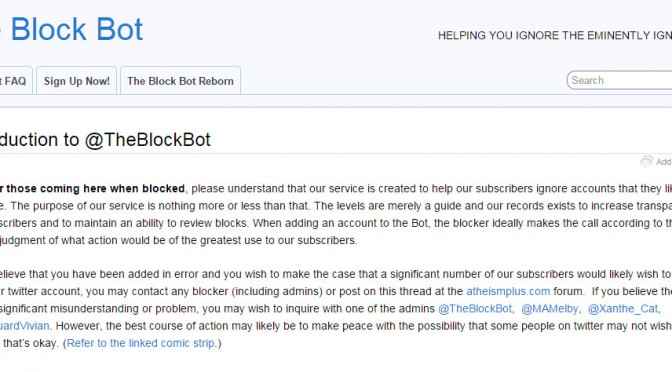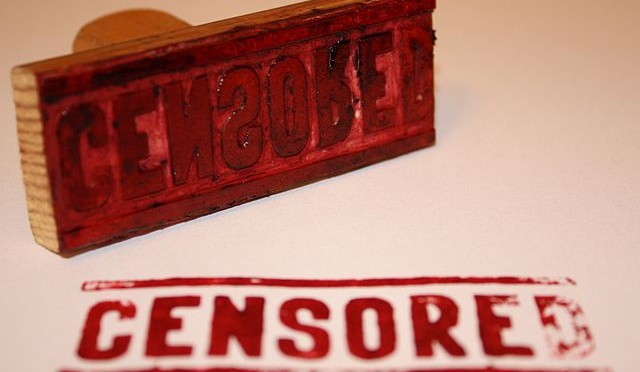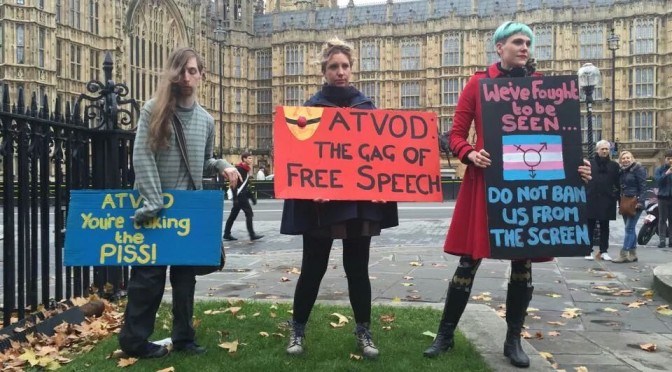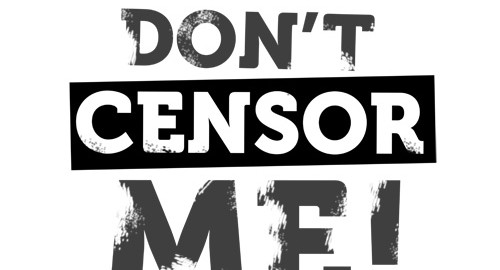[Editor’s note: it was with incredulity that I first heard about The Block Bot, a piece of software that automatically blocks Twitter users chosen by the Block Bot team, which has made itself judge, jury and executioner in deciding whose tweets should not be seen. The author of this piece is a law student who has decided to take legal action against the Bot team: read on for details… I encourage readers to support his action – see Go Fund Me link at the bottom.]
The internet is a dynamic place. As a new and increasingly important part of our lives the datasphere has really only existed for a few decades. I remember getting my first ‘proper’ internet email account at University in the late 1990s. It is natural therefore that society is still trying to find the right balance between freedom and regulation.
Society does need to draw lines. I personally draw the line at children, animals, dead people and ‘real’ violence. On the other hand, to invert something a senior Labour Party official once said to me, “There is censorship, and then there is taking the f***ing piss”. The Block Bot falls hard into the latter category.
The Block Bot, for those of you who are unfamiliar with it, is a subscription service to ‘protect’ users of Twitter from ‘harassment’. The Bot project maintains a database of ‘bad’ users of Twitter. When you sign up to the Block Bot it blocks them for you, 24 / 7. Silently and automatically, people are removed from your timeline.
The problems with the Block Bot are twofold –
The first major problem is that whilst it bills itself as protecting people from ‘harassers’ it in fact blocks many people who are merely political opponents of the Block Bot. The small print of the Block Bot project shows it has three levels of iniquity and, whilst the definitions have regularly changed, the current definition for Level 3 is, “This may include, but is not limited to, accounts that appear to frequently engage in microagressions, parrot tired talking points, show a sense of entitlement to have a conversation, exhibit a lack respect for the lived experience of others, etc.”https://archive.is/fVeaM
The Block Bot list contains Professor Richard Dawkins, Beatrix Campbell OBE and at one stage it it even included Barack Obama, although he was eventually removed. Users of the Block Bot are told who is blocked on the sign up page, although as there are around 10,000 usernames to read in tiny print it is infeasible for most people to read it. There are no further mechanisms to notify subscribers of blocks afterwards, although the Block Bot account tweets out the occasional unblock. Individuals have been explicitly added for no better reason than being humanists.
The second major problem is that the Block Bot maintains a database of the alleged ‘offences’ committed by people on the list. Professor Richard Dawkins is listed for (amongst other things) ‘#racist’, ‘#childabuseapologism’. Whilst Dawkins is many things he is neither racist nor a child abuse apologist. Beatrix Campbell OBE is listed on the bot for ‘freazepeach’ (supporting free speech is an offence … to the Block Bot team).
The database has usually been publicly searchable although it has been up and down recently following threats of legal action and its use as a back-end to search software written by opponents.
Silently, political views are removed from the world view of those who use the bot, enclosing them in an echo chamber bubble. At the same time, they will be interacting with the Block Bot team. Its administrators are best described as members of the extreme left – a noxious variation of the Tumblr tendency based around a hard left forum called, ‘Atheism Plus’ who take offence … easily. Members of the community are occasionally made an example of for deviating from the approved line.
It is like joining a kind of ‘stealth’ virtual cult, which rather than physically intern its subscribers in a compound somewhere, mentally interns them in a so-called ‘safe space’ in which dissenting views are excluded and the occasional initiate is dragged screaming from the ‘room’ as a warning to others – deterring anyone from following suit.
The Block Bot is subject to significant rate restrictions. For a new sign up it can only block 1 person per minute. That means that running 24 / 7 it will take a week to complete the initial block list. Existing users are subject to similar restrictions.
The end result is rather unhealthy. An automated online tool, the Block Bot does not rapidly block offenders but instead locks them in a sealed room with its administrators. The echo chamber does not brook dissent and of course the Block Bot team deliberately insulate themselves from complaints, which they regard as ‘harassment’.
All that changed earlier this year. After making a video critical of the Block Bot I was added to the list as a ‘Level 1’, ‘Troll’ and when I served two block bot administrators with letters before action all hell broke loose. Unable to comprehend that there might be other points of view they reported me to the police. The police are under a statutory duty to investigate and initially they did. One police force even served me with a ‘notice of harassment’ allegation. After an investigation that has now been rescinded. The police concluded that my actions were not harassment.
Now the boot is on the other foot. I have started County Court proceedings against Block Bot creator James Billingham, who lives in the UK. Readers will judge for themselves whether it is legal to –
- Maintain an ‘offenders’ database and add people for sexual allegations without telling them
- Not register the database with the ICO
- Make the database searchable online
- Write a ‘John Scalzi’ quotes bot to tweet snide remarks at aggrieved persons who contact you instead of having a clearly defined appeals procedure
Answers on a postcard. I am bringing a small claim for £1,000 under the recent ruling versus Google that persons whose data protection rights are breached are entitled to moral damages. In itself that is not enough to bankrupt Billingham or end the Block Bot. However, there are over ten thousand people on the bot. If I win Billingham could be looking at a seven-figure bill. Q – if a tenth of the list, (say 1,000 people) sue for £1,000 damages each, what is the bill if they win?
Litigation is always risky, although I have had three positive second opinions. I am running a Go Fund Me as a way to minimise risks. If you want a laugh, chuck in a £20, would you? If there is any money left at the end it will be spent on a London meet up for members of an anti-censorship, pro-consumer, pro-ethics group called KotakuInAction (free to join).
Sam Smith is an LPC Law Student who writes Matthew Hopkins News under the pseudonym Matthew Hopkins. Smith has been praised in Parliament for his pro-bono work as a McKenzie Friend. A former Labour Councillor, Sam Smith is now a member of the Conservative Party. Please back his Go Fund Me here. He can be followed on Twitter as @MHWitchfinder.







